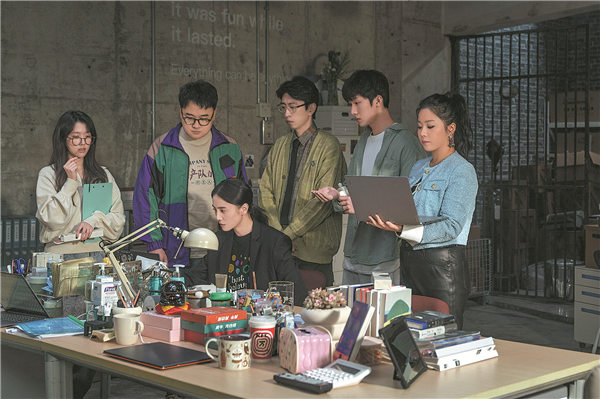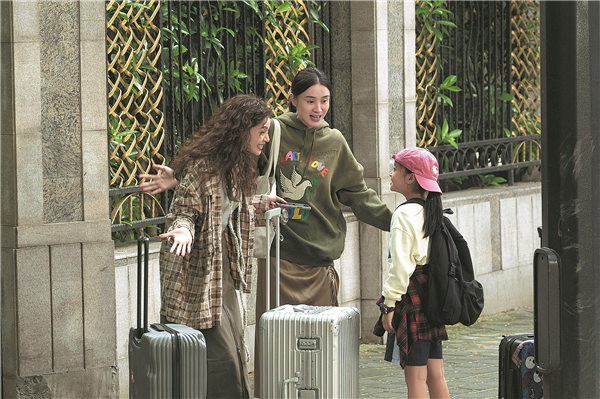
A still from Shao Yihui's film Her Story about how three female characters navigate their lives with humor, strength and moments of quiet grace, while confronting everyday struggles. [Photo provided to China Daily]
Surge in female-oriented movies not only reflects China's changing social mores, but also ties into wider world trends, Xu Fan reports.
Despite the evening chill, 34-year-old Yang Feifei recently left one downtown Beijing cinema in a warm, happy glow. Confessing that she had been feeling a little depressed in the wake of a failed relationship and workplace stress, she said she found respite in watching Her Story, the country's box-office champion this month.
A bit of a Chinese version of Barbie, the world's highest-grossing film last year, Her Story has emerged as an unexpected blockbuster. It employs a gentle, humorous tone to examine a series of pointed, controversial issues, such as the difficulties faced by single mothers and gender equality in sexual relationships.
Since its debut in late November, the film has earned more than 640 million yuan ($87.9 million), surpassing British director Ridley Scott's historical epic Gladiator II to dominate the single-day box-office charts for 24 days, according to Beacon, a real-time movie information tracker.
Thanks to this film, the previously subdued market has experienced something of a boost, propelling yearly box office earnings to more than 40 billion yuan by the end of last month, setting a positive tone for the upcoming New Year holiday season.
"When I watched the film with a female friend, I noticed that half the theater was filled with mostly young cinemagoers who laughed frequently. I believe this is because many of the movie's plots and lines are very relatable," says Yang.
Currently, Her Story has a rating of 9.1 points out of 10 on Douban, making it the popular review site's highest-rated Chinese movie of the year. It further earned a rating of 86.8 points to top a survey conducted by the China Film Art Research Center to gauge the satisfaction of cinemagoers with new releases.
For most industry insiders, the popularity of Her Story has been a local echo of a global film trend that has been gaining momentum in recent years, as evidenced by the popularity of films like Barbie in the United States, Anatomy of a Fall in France and There's Still Tomorrow in Italy, all hits about feminism.

A still from Shao Yihui's film Her Story about how three female characters navigate their lives with humor, strength and moments of quiet grace, while confronting everyday struggles. [Photo provided to China Daily]
New awakening
Her Story is director Shao Yihui's second feature set in Shanghai, China's most international city, known for its embracing of different lifestyles and ideologies.
After living there for six years, the Shanxi native and graduate of the Beijing Film Academy, who was born in 1991, made her directorial debut with B for Busy, a 2021 dark horse. With its mature narrative and keen insight, the film depicts the way educated women behave with independence, decisions and intelligence when in relationships, resulting in the film being hailed as one of the best female-oriented movies in recent years.
Her Story returns to familiar territory, centering on the lives of three female characters: Wang Tiemei, a former investigative journalist with a clear understanding of career and private life; Ye, a lovestruck band singer who falls for a playboy-like ophthalmologist; and Wang Moli, Wang Tiemei's 9-year-old daughter, an eccentric child who loves reading.
Despite difficulties and challenges, the three female characters keep their free spirit alive and follow their hearts.
The film highlights the women's strength and friendship, as exemplified by scenes in which Wang helps Ye get rid of a stalker late at night, and Ye helps Wang, a divorced single mother like her, care for her daughter. The two characters are neighbors in the same building. In addition, the film cleverly weaves female icons like Japanese sociologist Chizuko Ueno, Ruth Bader Ginsburg, a late justice of the Supreme Court of the United States, and Mexican painter Frida Kahlo into the plot.
Shao, who says that she absorbed criticism from B for Busy, says that Her Story has been crafted from an authentic female perspective and that the title is a metaphorical play on "history", an adoption of a classic trope often used by feminists to critique the fact that history is all too often written by men.
The director also says that while a lot of films have depicted the awakening of women to the need of understanding and defending their rights, she found an issue when viewing these movies from the perspective of the general audience, as many women are already well-versed in gender equality.
"What happens after women awaken and how do men react when they gain insight into feminism? I want to incorporate my reflections on these questions into my work," she says, explaining the motivation behind Her Story.
By way of example, one of the movie's most popular scenes depicts the three female characters having dinner with male friends, engaging in a conversation that naturally touches on menstruation, a topic traditionally considered taboo in public discussion.
Speaking on the persistence of taboos in advertising for menstrual products, with some ads still shying away by using blue liquid instead of red to demonstrate the absorptive properties of their products, Shao says that this can mislead young viewers lacking the requisite knowledge of the human body.
"I think it will be a good thing if the movie sparks debates and propels social progress," she says.

A still from Shao Yihui's film Her Story about how three female characters navigate their lives with humor, strength and moments of quiet grace, while confronting everyday struggles. [Photo provided to China Daily]
Developing the genre
A report released by the China Film Association and Beacon reveals that women accounted for 58 percent of all online ticket buyers by October this year, an 11 percent increase compared to the same period last year. As a result, an increasing number of domestic films and TV dramas have emerged to cater for this audience, signaling potential growth in the previously underdeveloped genre, according to industry insiders.
The number of acclaimed entries in recent years could fill a lengthy list. Send Me to the Clouds starring Yao Chen is the story of a single woman in her 30s who has been diagnosed with cancer as she struggles to raise funds for surgery, and explore sexual experiences before the illness renders this impossible.
Like a Rolling Stone, featuring Berlin International Film Festival best actress Yong Mei, draws inspiration from the reallife account of a 56-year-old woman who leaves her abusive husband to travel across China alone.
YOLO, this year's highest-grossing film, struck a chord with numerous cinemagoers for its portrayal of an oversized woman who regains her self-confidence after facing a series of adversities and fighting in a professional boxing match.
"From an academic standpoint, these films directly address women's dilemmas and their quest for equality," says Gong Yan, a professor at the Film, Television, and Communication College at Shanghai Normal University.
"Going back to the late 1980s or early '90s, the Chinese film industry was already producing such films, but present-day themes are more relevant to contemporary viewers. The surge in such movies also aligns with the increasing number of educated women and the rapid evolution of the internet," she says.
What propelled Her Story to popularity is its adept use of comedy to shine a light on the current status of women in a way that steers clear of being offensive or overly aggressive, according to Gong.
She says that despite the rise in popularity of these films, they predominantly resonate with a niche audience, mostly attracting an educated class of women.
This is due to the enduring demand in third- and fourth-tier cities for television dramas and other media that perpetuate traditional romances and depict women in subservient roles, generally falling for wealthy, domineering men.
Gong adds that despite the existence of films, like Song of Spring, about an 85-year-old mother caring for her 65-year-old daughter with Alzheimer's, and Girls Always Happy, which also explores a mother-daughter relationship, these films have only achieved modest success at the box office.
This suggests that they still have a considerable way to go in gaining broader viewership.
Lai Li, a market analyst at Maoyan, a leading platform for internet entertainment, points to the scarcity of female filmmakers in the industry, and underscores the importance of training more female talent, as female filmmakers have a more profound understanding of women's struggles and emotional needs.
"As society progresses and evolves, we believe that films centered on women will experience a surge in quantity, narrative quality and box-office success, making it a promising market," Lai says.